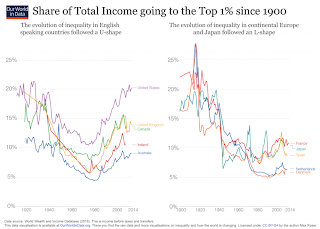Most sections include data that can be used to incorporate in part (b), paper 1, essays that relate to income distribution.
A section in this site of particular interest to IB Economics candidates is titled 'How has inequality in high-income countries evolved over the last century'
Here we see that income concentration in the US and other other English-speaking countries follows a U-shaped long-term trend. But...
...in equally rich European countries, as well as in Japan, the development is in fact quite different. The income share of the rich has decreased over many decades, and just like in the English-speaking countries, it reached a low point in the 1970s. In contrast to the English-speaking countries, however, top income shares have not returned to earlier high levels; they have instead remained flat or increased only modestly. The evolution of top income inequality followed an L-shape here. Income inequality in Europe and Japan is much lower today than it was at the beginning of the 20th century.
On the 'U- shaped path of income concentration in the US it is also worth watching a 6 minutes Stanford University video featuring Emanuel Saez of Berkeley, one of the most important researchers of income inequality. In this short video, he provides excellent data and visuals on the fall and subsequent rise in income inequality in the US over the past 100 years. It can be found here: The Takeoff in Income Inequality: Emmanuel Saez.
A longer (16 minutes, Berkeley lecture - teach-in) version can be found here (I show it to my HL class every year): Economic Inequality Teach In: Emmanuel Saez .
Back now to the 'Our World in Data: Income Inequality' article by Roser and Ortiz-Ospina. The following are also sections that are all worth exploring:
- High-income countries tend to have lower inequality
- Top income shares
- Inequality in the US has been growing substantially in recent decades
- Inequality in different world regions
- Relative poverty
- How are the incomes of the rich changing relative to the incomes of the poor?
- How does income inequality differ from consumption inequality?
In my opinion, income inequality (as well as wealth inequality and inequality of opportunity) topics are a must for a well prepared IB Economics candidate. Hopefully the above can provide some useful background information that will help students prepare for May & November exams.
Rising inequality in our world is of course way more important than exam preparation...


